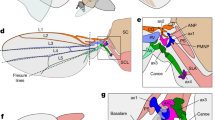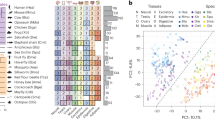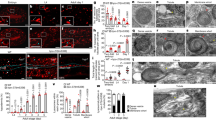Abstract
The final step in the moulting of all insects is ecdysis, the shedding of the cuticle of the previous instar, which is triggered in Lepidop-tera by the neurosecretory peptide eclosion hormone1. This hormone acts directly on the nervous system to release the appropriate motor patterns for larval, pupal and adult ecdyses2–5, but there are only brief periods near the end of each moult when the nervous system is competent to respond to the hormone. Previous experiments have shown that the action of eclosion hormone on the nervous system at pupal ecdysis in the tobacco hornworm, Manduca sexta, is mediated by the second messenger cyclic GMP1. Here we report that the hormone-stimulated increase in cGMP results in the phosphorylation of two proteins, each with an apparent relative molecular mass (Mr) of 54,000. Moreover, the brief periods during which the central nervous system (CNS) is responsive to eclosion hormone seem to result from the transient presence of these substrate proteins within the nervous system. This provides a novel mechanism by which hormonal responsiveness can be regulated.
This is a preview of subscription content, access via your institution
Access options
Subscribe to this journal
Receive 51 print issues and online access
$199.00 per year
only $3.90 per issue
Buy this article
- Purchase on Springer Link
- Instant access to full article PDF
Prices may be subject to local taxes which are calculated during checkout
Similar content being viewed by others
References
Truman, J. W. J. exp. Biol. 54, 805–814 (1971).
Truman, J. W. J. exp. Biol. 74, 151–174 (1978).
Weeks, J. C. & Truman, J. W. J. comp. Physiol. 155A 407–422 (1984).
Morton, D. B. & Truman, J. W. J. comp. Physiol. 157A, 423–432 (1985).
Greengard, P. Nature 260, 101–108 (1976).
Truman, J. W., Mumby, S. M. & Welch, S. K. J. exp. Biol. 84, 201–212 (1979).
Schwartz, L. M. & Truman, J. W. Proc. natn. Acad. Sci. U.S.A. 81, 6718–6722 (1984).
Truman, J. W., Taghert, P. H. & Reynolds, S. E. J. exp. Biol. 88, 327–337 (1980).
O'Farrell, P. Z., Goodman, H. M. & O'Farrell, P. H. Cell 12, 1133–1142 (1977).
Laemmli, U. K. Nature 227, 680–685 (1970).
Forn, J. & Greengard, P. Proc. natn. Acad. Sci. U.S.A. 75, 5195–5199 (1978).
Reynolds, S. E., Taghert, P. H. & Truman, J. W. J. exp. Biol. 78, 77–86 (1979).
Copenhaver, P. F. & Truman, J. W. J. Insect Physiol. 28, 695–701 (1982).
Kuo, J. F. & Greengard, P. J. biol Chem. 245, 2493–2498 (1970).
Kuo, F., Wyatt, G.R. & Greengard, P. J. biol. Chem. 246, 7159–7167 (1971).
Lincoln, T. M. & Corbin, J. D. Adv. Cyclic Nucleotide Res. 15, 139–192 (1983).
Author information
Authors and Affiliations
Rights and permissions
About this article
Cite this article
Morton, D., Truman, J. Substrate phosphoprotein availability regulates eclosion hormone sensitivity in an insect CNS. Nature 323, 264–267 (1986). https://doi.org/10.1038/323264a0
Received:
Accepted:
Issue Date:
DOI: https://doi.org/10.1038/323264a0
This article is cited by
-
Chemical codes for the control of behaviour in arthropods
Nature (1989)
-
Age-dependence of octopaminergic modulation of flight muscle in the locust
Journal of Comparative Physiology A (1989)
Comments
By submitting a comment you agree to abide by our Terms and Community Guidelines. If you find something abusive or that does not comply with our terms or guidelines please flag it as inappropriate.



